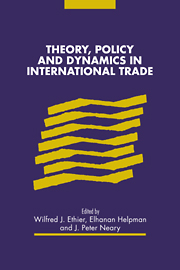Book contents
- Frontmatter
- Contents
- List of conference participants
- I Introduction
- II History, geography and the theory of trade
- III The structure of simple trade models
- 6 Job market preferences and international trade
- 7 Production indivisibilities in a short-run trade model
- 8 Firms, entry and hysteresis in the Heckscher–Ohlin–Samuelson model of production and trade
- IV Policy towards international trade
- V Trade, growth and dynamics
- Index
8 - Firms, entry and hysteresis in the Heckscher–Ohlin–Samuelson model of production and trade
Published online by Cambridge University Press: 16 March 2010
- Frontmatter
- Contents
- List of conference participants
- I Introduction
- II History, geography and the theory of trade
- III The structure of simple trade models
- 6 Job market preferences and international trade
- 7 Production indivisibilities in a short-run trade model
- 8 Firms, entry and hysteresis in the Heckscher–Ohlin–Samuelson model of production and trade
- IV Policy towards international trade
- V Trade, growth and dynamics
- Index
Summary
Introduction
Simple general equilibrium models of production have been used extensively in the theory of international trade to study the determinants of comparative advantage and to explore the effects of various disturbances such as technological changes, factor growth and policy rearrangements on the structure of international trade and the distribution of income. The standard Heckscher–Ohlin–Samuelson model of two factors is the most popular of all although there are different possibilities such as the Ricardian model of a single factor and that of three or more factors. They commonly assume that technology of each sector exhibits constant returns to scale and that perfect competition prevails in all markets with the profits of firms being driven to zero in equilibrium. An extremely useful method to analyze these models was developed by Jones (1965, 1971) and has been applied to a wide range of problems.
The common assumptions of the models are, however, rather restrictive. The assumption of constant-returns-to-scale technology, together with the assumption of perfect competition, implies that the size of firms in each industry is indeterminate. It obscures the identity of firms since they could be infinitesimally small. Admittedly, it agrees completely well with perfectly competitive markets, but it is often at variance with monopolistic or oligopolistic markets. The recently developed models of international trade under imperfect competition usually specify the identity of firms by introducing product differentiation and/or increasing returns to scale in technology (see Helpman 1983, Helpman and Krugman 1985, 1989 for instance). The assumption of zero profits is equally restrictive. It implicitly assumes away interindustry differentials in mark-up ratios, a possibly important source of domestic distortions.
- Type
- Chapter
- Information
- Theory, Policy and Dynamics in International Trade , pp. 107 - 128Publisher: Cambridge University PressPrint publication year: 1993



